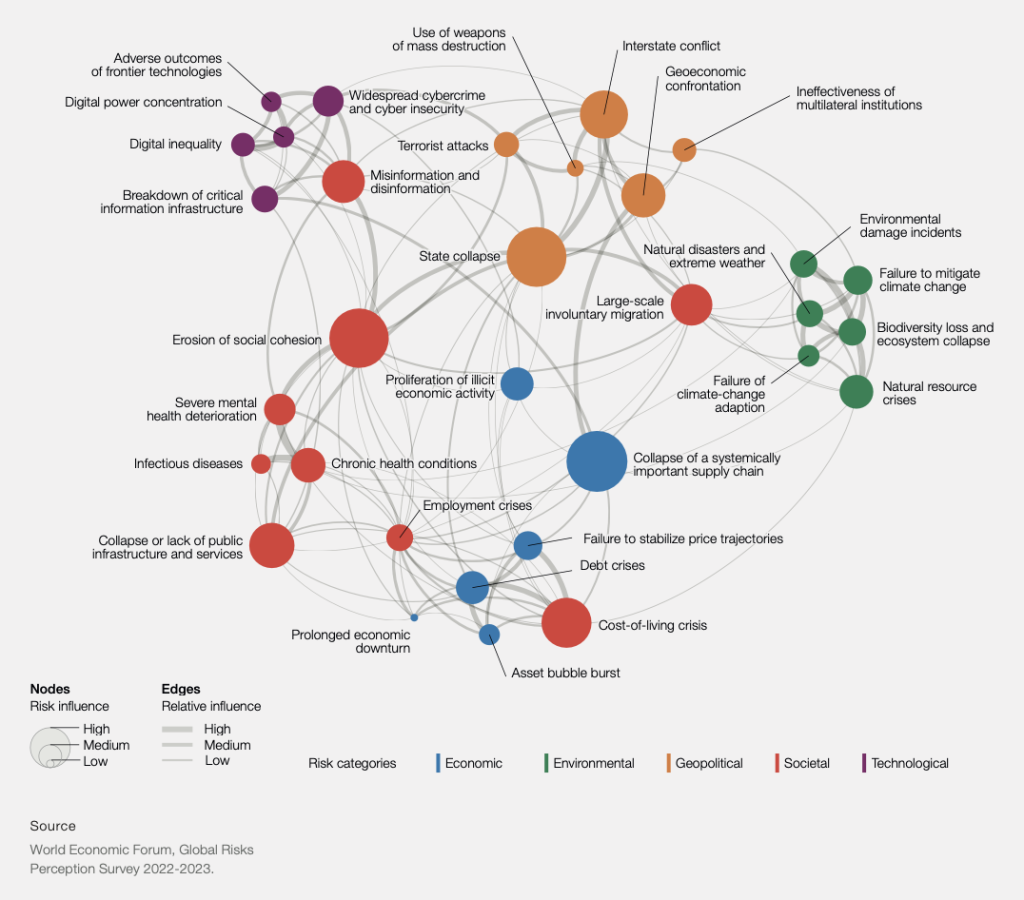About WCGSS 2023
In today’s interconnected world, humanity faces a complex and interrelated web of global challenges that demand urgent attention and collaborative action. These challenges range from climate change and crisis, global poverty, post-pandemic economic slowdown, widespread corruption, and democratic deficit to issues of artificial intelligence (AI), technological disruptions, and geopolitical conflicts and wars. They are intricately interplayed, intertwined, and mutually reinforcing, prompting various global issues, making their solutions multifaceted and interdependent. Climate change and crisis, for instance, induce global warming and extreme weather events, rising sea levels, ecosystem disruption, and health impacts. These further exacerbate food and water scarcity, trigger mass migration, and fuel social and political instability[1].
Similarly, poverty and inequality can lead to social and political unrest and environmental degradation. Post-pandemic economic slowdown, in addition, also poses challenges to governments worldwide to instigate economic rebound and to maintain their ability to prosper their societies. The vast spreading of corruption and democratic deficit sometimes hinder governments from maintaining their grips on creating social, political and economic stability. Meanwhile, the wave of AI and technological disruption impacts various aspects of society and the economy. Despite delivering efficiency and productivity gains, innovation and new opportunities, improved quality of life, sustainability and environmental benefits, it also exerts negative impacts engulfing job displacement and inequality, privacy and security concerns, social and ethical implications, and the digital divide. Even worse, geopolitical conflict and wars put more complexities of global challenges as they have wide-ranging impacts on society, economies, and international relations. The consequences of such conflicts can be significant and long-lasting, including humanitarian crises, economic jeopardy, political instability and governance challenges, regional and global instability and insecurity, environmental degradation, refugee and migration crisis, and diplomatic and international relations impacts. All these complexities and interconnected web of global problems and challenges are evident and could be depicted through World Economic Forum (WEF) Global Risk Perception Survey 2022-2023 below.[2]
Figure 1. Global Risks Landscape: An Interconnections Map[3]

Source: World Economic Forum (2023; p.10)
Recognizing the interconnections of the web of global problems and challenges above is crucial to formulating comprehensive and sustainable ideas and solutions. Effectively navigating this nexus of global challenges requires a holistic approach that considers the interconnected nature of the problems at hand and concurrently addresses the root causes, embraces innovative solutions, and fosters cooperation among nations and stakeholders. Fragmented efforts often yield limited results or unintended consequences. Instead, multiple stakeholders must exert ideas and practices considering interdependencies and feedback loops among different challenges. Sharing knowledge, expertise, and best practices is critical for navigating the nexus of global challenges as they induce innovative solutions and collaborative efforts across various sectors and stakeholders that pave the way for a more sustainable, resilient, and inclusive future and lead to breakthrough innovations that address multiple challenges simultaneously. Effectively addressing the nexus of global challenges is a moral imperative and an opportunity to build a better world for current and future generations.[4]
Based on the background above, the Faculty of Social and Political Sciences, Hasanuddin University, initiates a conference that gathers and shares ideas, research, practices, and experiences to deal with contemporary global problems and challenges. Hence, we cordially invite all scholars, researchers and practitioners to present their ideas and best practices through a paper presentation at the World Conference on Governance and Social Sciences (WCGSS) 2023 on 8-9th November in Makassar, South Sulawesi, Indonesia. This conference could serve as an opportunity to maximize the potential of facing interconnected issues and global challenges. The ideas, research, practices, and experiences sharing and exchange could become the basis of future collaborative efforts undergone by various stakeholders and sectors. In addition, this conference will also be a momentum to provide the opportunity for scholars, researchers and practitioners to contribute more to the world by exposing their ideas and findings on addressing global issues and challenges through internationally accessible and recognized proceeding publication.
References
[1] World Economic Forum, Global Risk Report 2023 18th Edition: Insight Report (Geneva: World Economic Forum, 2023), 6-11, https://www3.weforum.org/docs/WEF_Global_Risks_Report_2023.pdf
[2] World Economic Forum, Global Risk Report 2023 18th Edition: Insight Report, 11-24.
[3] World Economic Forum, Global Risk Report 2023 18th Edition: Insight Report, 10.
[4] G. Abord-Hugon Nonet et al., “Multi-stakeholder Engagement for the Sustainable Development Goals: Introduction to the Special Issue,” Journal of Business Ethics 180 (2022): 945-957, https://doi.org/10.1007/s10551-022-05192-0
v

